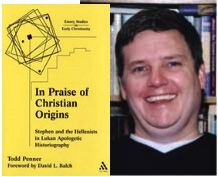The most important thing we need to know when reading any book is what kind of work it is. Is Luke’s Acts history or novel? If it is history, what sort of history? Above all, what did “history” mean to writers/readers in the Roman world of the first and second centuries CE?
 Todd Penner, Professor of Religious Studies at Austin University, has written a richly informative study of historiographical writing in antiquity as it is relevant to our appreciation of Acts, in particular to Luke’s account of Stephen and the Hellenists, Acts 6:1-8:3. This is the section most scholars of Christian origins consider historical at some level. Usually they suspect Luke was attempting to cover-up real events of unsavory divisions within the early church. Penner has a different perspective. Those little details that other scholars see as evidence of a cover-up Penner sees as quite coherent contributions toward Luke’s larger literary and theological narrative. But other scholars have generally not read Acts with any significant understanding of its literary character and have accordingly misread literary sails as archaeological trowels. Penner’s book is In Praise of Christian Origins:
Todd Penner, Professor of Religious Studies at Austin University, has written a richly informative study of historiographical writing in antiquity as it is relevant to our appreciation of Acts, in particular to Luke’s account of Stephen and the Hellenists, Acts 6:1-8:3. This is the section most scholars of Christian origins consider historical at some level. Usually they suspect Luke was attempting to cover-up real events of unsavory divisions within the early church. Penner has a different perspective. Those little details that other scholars see as evidence of a cover-up Penner sees as quite coherent contributions toward Luke’s larger literary and theological narrative. But other scholars have generally not read Acts with any significant understanding of its literary character and have accordingly misread literary sails as archaeological trowels. Penner’s book is In Praise of Christian Origins:
There is nothing in Acts 7 to suggest that there lies behind them anything but an adept ancient writer, someone extremely well-versed in Jewish traditions and styles of rewriting the biblical story.
The narrative portions of Acts 6:1-8:3 leave one with the same impression.
Could the narrative portions be historically accurate and true? Absolutely. Could they be completely fabricated? Absolutely. Could the truth rest somewhere in between? Absolutely.
The problem, of course, is that it is impossible to prove any of these premises.
Attempts by Hengel and others to intuit their way behind the stories aside, the unit is too tightly knit to allow one to go beyond what is given in the narrative itself. If the dominant view in Acts scholarship is that one can separate out the core historical events from the Lukan redaction, this study argues for the futility of such attempts. (In Praise of Christian Origins, pp. 331-332, my formatting)
Acts 6 opens with a problem in the church. Some of the widows are being neglected. Continue reading “Luke’s “Ahistorical” Widows, Hellenists and Deacons”
